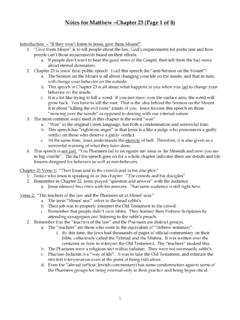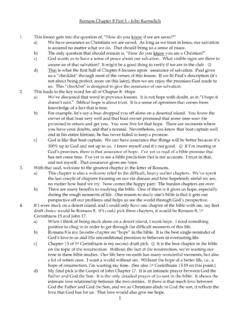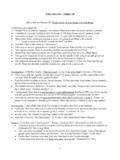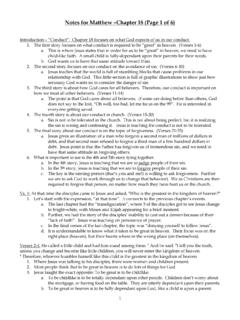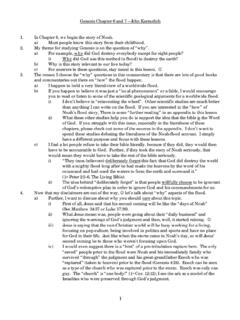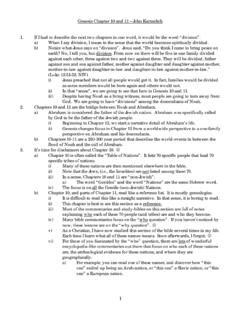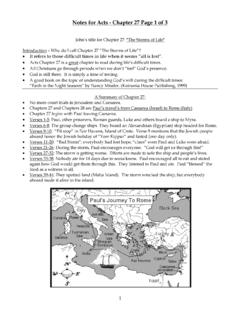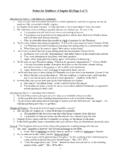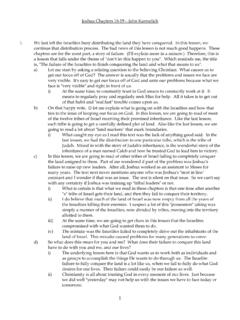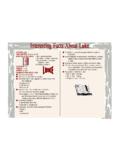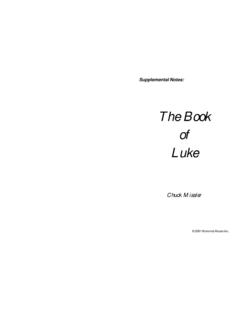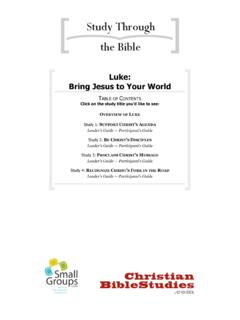Transcription of Luke Chapter 3 - BibleStudyEmail.com
1 1 luke Chapter 3 John Karmelich 1. My lesson title is, "Preparing people for the coming of Jesus and preparing Jesus for the world." I admit that I took that title from a John MacArthur sermon and changed it a little. The more I read this Chapter , the more I realized how appropriate it was. With that stated, let me describe what is happening in this Chapter and then talk about why this is important for our lives: 2. The Chapter focuses on two key historical events. The first is John the Baptist and what he did to prepare people for Jesus coming in the world. You may recall that Chapter 2 ended with part of Jesus' life when he was 12 years old. luke does his best to "time stamp" the starting date of John's ministry by stating all of the people in charge of government and the Jewish leaders at that time. In short, it is now about 18 years after Chapter 2. At that point the text talks about what John said and did to prepare people for the coming of the Messiah.
2 Note that luke writes outside of a time sequence here. My point is luke uses the first half of Chapter 3 to state the purpose, mission and end of John's ministry to prepare people for Jesus' coming. a) Then the Chapter does an abrupt switch, and gives a genealogy of Jesus going backwards from his parents all the way back to Adam. Some have argued that this is the genealogy of Joseph and that it involved actual parents versus adopted parents. I say that because the names given differ from the genealogy given in Matthew's Gospel, while both lists do include King David. I take the classical position that this is the genealogy of Mary even with the fact that Mary's name is not listed, but only Joseph's. Let's just say for now that the answers involve the male dominance over that culture and that luke 's goal is to show us how Jesus is also fully human with a genealogy that can be traced back to Adam.
3 The good news is I'm not going to go name by name through this list, but just show you why luke bothered to include this list and what it teaches us about Jesus coming in the world. 3. With all that said, let me now focus on the important question: Why should we care about any of this stuff? After all, most of us already accept the literalness of John the Baptist preaching about repentance before Jesus started His ministry. Most of us also accept the literalness that Jesus was a literal descendant of King David, let alone Abraham and even Adam. So given the fact that we as Christians already accept what is written here as historical facts, why should we study Chapter three and what is it God wants us to learn from this Chapter ? The answer is my lesson title that I should state again: "Preparing people for the coming of Jesus and preparing Jesus for the world". a) Consider how God wants us to use the most valuable thing He gives us, our time.
4 To be a good witness for Him and share Him with others. That doesn't mean we have to go be a foreign missionary. It means Christians are missionaries in whatever role our lives are at any given moment. To make my point another way, a missionary isn't just someone our church may financially support. It is whom all of us Christians are supposed to be. That does not mean we have to go dress like John the Baptist and go out in the wilderness and wait for people to come to us. Just as God had a unique and special role for John to play in presenting Jesus to the world, so God has a unique role for each of us to do in our own missionary work of presenting Jesus to others around us. Neither does it mean we have to say, preach Jesus while at work or at home. It does mean we live a life differently as so others know we are believers and we can give an answer if they ask us about our faith. b) What I'm getting at is this Chapter teaches us how we too are to prepare for Jesus coming into the world and how we should react to that message.
5 The good news I'm not asking you to memorize all the facts and names given in this Chapter . They are here to show us the literalness of John the Baptist's ministry and the literalness of Jesus being fully human as a direct descendant of the bible patriots, Adam, Abraham and David so that we can be witnesses for Jesus in the world around us. With that said, let's get started on the text. 24. Chapter 3, Verse 1: In the fifteenth year of the reign of Tiberius Caesar--when Pontius Pilate was governor of Judea, Herod tetrarch of Galilee, his brother Philip tetrarch of Iturea and Traconitis, and Lysanias tetrarch of Abilene-- 2 during the high priesthood of Annas and Caiaphas, the word of God came to John son of Zechariah in the desert. a) Let's be honest here: These first two verses give us a bunch of unpronounceable Roman and Israelite names that we'll probably forget right about now. To state this another way, why should we care about who was in power at the time when John the Baptist came on the scene?
6 Yes I can say that they didn't have "year 30AD" yet, and time was marked by who was in power at the moment. However, that is only the tip of the iceberg of why we have these names here. Let me put it this way: The purpose of learning a little historical background here is not to be an expert in biblical times history, but to understand what was life like when Jesus and John the Baptist came on the scenes. To keep it simple, if you think you're life is difficult, imagine living when circumstances were so corrupt, it would be almost unbearable to live. That's what we have here and what I need to explain. With that said, let me give a little background about these people and you'll see my point. b) Remember that luke 's goal of these two verses is to give us a "when". The first clue of the "when" is what Roman Emperor was in power. His title was Tiberius Caesar. If you read my lesson on Chapter 2, when John and Jesus were born the emperor back then time was called Caesar Augustus.
7 My simple point is another emperor is now in charge. i) You may also recall from the last lesson that the leader the Romans let rule over Israel at that time was named Herod. He's also known in history as "Herod the Great". Herod was a pro-Roman Edomite who the Romans' let rule in exchange with keeping peace with Rome. To put it mildly, the Jewish people didn't like Herod nor did the like the Romans ruling over them. ii) When Herod died, his kingdom was divided into four parts. In Verse 1, you may notice the word "tetrarch". That just means "fourth". In other words the territory that Herod ruled over was divided into four parts after he died, and he had one son rule over each part. It's a little like when Alexander the Great died, and his territory was divided into four parts with each of his four generals getting a part. iii) To make a long story short, one of those sons was so corrupt, the Romans replaced him and that's when Pontius Pilate came on the scene.
8 He too had his own issues of corruption. Let's just say the Israelites didn't fair well under the oppression of the Roman Leadership. c) If all of that wasn't bad enough for the Israelites living back then, I also need to discuss who were the high priests at that time. The text says Annas and Caiaphas. Annas was not a direct descendant of Aaron. He was a high priest appointed by Rome. To state it another way, the priesthood was financially corrupt and I suspect "Rome" got kickbacks with these guys in power. Annas has four sons and a son-in-law named Caiaphas. Think of it as Annas being the real man in power and then he rotated his children and son in law having the title of high priest while "Annas" pulls the strings. If you know your bible you may recall that when Jesus was on trial at the end of his life, he was put before these two men as part of that trial. Both Jewish and Roman historical records describe these two as being corrupt leaders and that's my main point here.
9 D) The reason I give all of this background is not for us to memorize their names. It is for us to understand how difficult life was for the average Jewish person living back then. They had to deal with corrupt leadership. The desire for a Messiah to relieve them from both Rome and its corrupt influence had grown so that they might even accept the message of repentance as John and Jesus were starting to come on the scene. The point for us is if we think our world is corrupt, it is nothing compared to what they had to deal with. If God can send a savior living under those conditions He can and does help us with whatever we have to deal with today. 35. Verse 3: He went into all the country around the Jordan, preaching a baptism of forgiveness of sins. a) Meanwhile, it's time to get back to John the Baptist himself. Remember that the first half of this Chapter focuses on Jesus' purpose, life and mission.
10 You can think of Verses 1 and 2 as the focus on "when". Verse 3 then focuses on "what". That what is preaching about the forgiveness of sins. b) A little background might be helpful here. In the Jewish culture of that day, the idea of a person being baptized was only for non-Jewish people to convert to Judaism. Someone who's born Jewish would never need to be baptized as in effect they believed they were saved just based on their national heritage. It's like believing my mother and dad were both strong Christians, so I'm automatically saved. To state the obvious, it doesn't work that way, but that's the way many people think. c) I also need to talk briefly about the concept of repentance. It's more than just being sorry for sins one has committed. It is about wanting to change one's lifestyle based on trusting God's in charge of one's life. It's amazing to realize how few Christian churches today do preach on the necessity of repentance in order to be saved in the first place.
